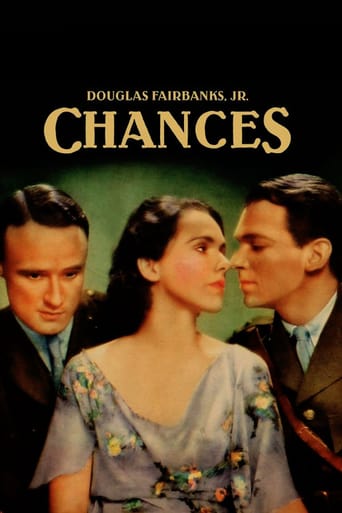jacobs-greenwood
Directed by Alan Dwan, with an adaptation by Waldemar Young, this slightly above average World War I drama borrows a romantic storyline from Hell's Angels (1930), that of two brothers, one carefree and one serious, who go off to fight in the same unit, while leaving behind a woman they both love. Douglas Fairbanks Jr. and Anthony Bushnell play the brothers, respectively, and Rose Hobart plays the woman who (like Jean Harlow) is initially the love interest of the serious brother, before she falls hard for the carefree one. Even the same brother dies in the end, though not by heroism and far less dramatically. The only real difference is that all three were childhood friends in this one; Bushnell and Hobart were close whereas Fairbanks Jr. was annoyed by her.In 1914 London, where the inseparable brothers are going through training together, Fairbanks Jr. is captivated by a beautiful woman he meets in the fog, not realizing it's someone from his past until he and Bushnell return to their mother's (Mary Forbes) where Hobart is a guest. In a party sequence, (not entirely unlike the other film), Fairbanks Jr. wins over Hobart's until he learns of his brother's plan to marry her. He then uses another woman (Florence Britton, uncredited) to reestablish his playboy persona in front of Hobart, hoping she'll be satisfied with Bushnell.Once the brothers are shipped off to war, Fairbanks Jr.'s character gets to perform admirably in battle, earning him a seven day leave. His brother asks him to find out why his would-be fiancée has stopped writing him. On his way through Calais, he runs into her, she's a driver now, and they declare their love for each other once again. Fairbanks Jr. urges her to write Bushnell of their love, then spends all but the last day of his leave with his mother. His last day is spend romantically with Hobart's character, who gives him a picture of herself with a loving inscription to "keep her close, so she can protect him".Sometime after he returns, his brother learns the truth about who loves whom, through a misunderstanding with the aforementioned picture. Other than that, there's not much left besides some unspectacularly staged (when compared to The Big Parade (1925) or All Quite on the Western Front (1930)) ground battle sequences; of course it would be nearly impossible to top Hell's Angels (1930) aerial sequences. Holmes Herbert plays the brothers' commander; Edmond Breon a General, Harry Allen a Private.
bkoganbing
We're so far removed at this point from the generation during an after World War I that a film like Chances is almost incomprehensible today. Douglas Fairbanks, Jr. and Anthony Bushell are the Ingleside brothers and both are soldiers, officers and gentlemen in the best British stiff upper lip tradition.Anthony Bushell is in love with a childhood friend played by Rose Hobart and Fairbanks likes to play the field. Problem is that Hobart's decided she's got eyes only for Fairbanks and then Fairbanks realizes what's been blooming in his back yard. If you're a fan of these kind of romantic films and knowing that the background is World War I, you know that the issue will be settled on the battlefield.I don't like panning these kind of films because they do reflect their times and are done with great sincerity. The battle scenes are very nicely done by Warner Brothers. Nevertheless I'm not sure how today's audiences would take to something like this.But I will say that Douglas Fairbanks, Jr. does show in abundance the style and charm that made him a star. It wasn't just on his famous father's name that he stayed a star.
tonstant viewer
This film is a weird hybrid of silent film and stage play, but it never quite manages to be a movie.The battle scenes are impressively cinematic, well-staged and photographed in the D.W. Griffith mold, but what comes between them is very uneven.The British accents come and go and the acting is stagy. Douglas Fairbanks Jr. is engaging as a rake at the beginning but can't encompass the deeper emotions towards the end. Rose Hobart is much better at playing resentment and bitterness than romance, which is my guess why she slid from lead to character woman so quickly. Anthony Bushell is a wet noodle as the stolid brother, which is probably right, but no fun to watch.And what was this project doing at First National (Warners) anyway? Paramount or MGM could function well with a bunch of rowdy English aristocrats at play, but they might as well be moon-men to the studio home of Jimmy Cagney and Edward G. A tommy-gun or malicious half-grapefruit would have helped this film immensely.So, interesting as an awkward curio, but constipated compared to the great silent WWI films like The Big Parade or What Price Glory? and clumsy compared to the great talkies that would accompany WWII.
drednm
Douglas Fairbanks, Jr. is very good in this romance/war film, playing a man who loves his brother's fiancee. Good cinematography helps put a gossamer glow on this early talkie that also boasts good work by Rose Hobart and Anthony Bushell. It never gets sticky but still manages to show moving relationships between brothers and between Fairbanks (always underrated) and Hobart, who unaccountably sank quickly to second leads. The story may seem a tad dated now, but this old film is definitely worth a look. Mary Forbes is the mother, and I think Ethel Griffies plays the drunken flower seller.



